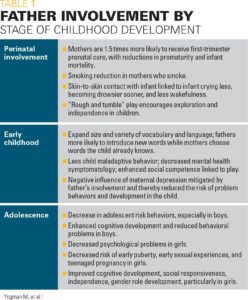Young and prospective fathers need a whole lot of role changing orientations in the child care mix to correct the imbalance in child-parents love that is skewed in favor of mothers. To help them out, first generation parents (mothers & fathers) and the society at large have a lot to do.
At wedding receptions, in south West Nigeria setting, Comperes often jokingly ask questions such as who really owns the child between father and mother. The guests in response usually chorus mothers! To take the question further, the Compere would give hypothetical benefits and challenges of parenthood to which, for the benefits, the guests give more yes to the mother and for the challenges, the father comes top.
There was a story of a man who impounded or may be confiscated his son’s brand-new car. The story goes thus: The man through thick and thin manage to send a very brilliant son of his to highbrow schools for the boy’s potentials to be properly harnessed. This boy went to private university where the father was paying huge amount of money per session. This boy in his resplendent brilliance had distinctions in all his exams in the university.
For the convocation/award ceremony the boy gave his 2 Invite cards to his mother and his fiancée to attend. This boy’s performance during National Youth Service was also very exemplary such that he was recognized by the State’s Authority. For the recognition ceremony, he was asked to invite two people. Again, he invited his mum and fiancée. Shortly after he started work in one of the blue chips’ companies, his employers organized another meritorious service award to which he invited his mum and the fiancée.
Few years later, the boy came home, with his fiancée, in a brand-new yet- to- be- registered car, picked up the mother and off they went for shopping. After returning from shopping, he approached his Dad to come and bless the car for him. The father collected the car keys from his son went to his room to safe keep the keys, returned and asked the boy to kneel down for prayers: “Father Lord, thank you for the life of my son, thank you for what you have used him to do so far for my wife and thank you for enabling him to dash me a brand-new car. Lord, grant him the grace to buy another car for himself, and the grace to receive car gift from his children. Amen.” The rest, our people say, is history.
Our people say “mothers are like gold; fathers are like glass mirror”. Gold, solid and precious, glass mirror fragile and breakable. What a comparison?
The scenarios depict the lot of fathers in the child care mix. Yes, dads are the breadwinner of the family; Yes, they pay all the bills including school fees, utilities, medicals, rents, foods etc. But while fathers are busy looking for money to settle the big bills, the mother was busy looking after the child’s little needs like sugar, milk, groundnut, sweets, fruits (for young children) and socks, pants, underwear, bras, garri, and biscuits for the older children. These little needs are the direct needs of the child and seeing the mother providing the needs engraves mother’s love deeply in the young mind of the child. The children don’t feel the direct benefits of the huge sums that the father is paying to settle the school bills.
Fathers are rarely at home for economic reasons. They are out there net-working to provide for the family. So, it is the mother who spends quality time with the children to further enshrine mother -child bonding.
At a men’s only “Father-Child Relationship Seminar”, the resource person warned men not to trade love for discipline. A situation where mother had to leave the punishment of the children exclusively to father, even while the misdemeanor took place in the absence of the father, makes the child to psychologically associate father with pain. And such association may be long lasting.

INVOLVED FATHER
Dads must no longer be contented with the role of “breadwinner” only. Children need involved father for their physical, psychological, emotional and cognitive developments. Father must be fully involved in the development of the child right from the conception of the child in the mother’s womb, birth, infancy, early childhood and adolescence. Father must spend more quality time with the kids.
Pregnancy
Expectant fathers must be involved right from the pregnancy stage. They must help and support the pregnant wife through antenatal. Involved father don’t just pay the antenatal bills, they follow their wives on health care visit and ask questions that help reassure their wives. Research has found that mothers are 1.5 times more likely to receive prenatal care in their first trimester if the father is involved, leading to reduced risk of premature births and infant mortality.
Infancy
According to the Theory of Attachment, Psychologists say baby develops an enduring emotional bond with figures that respond sensitively, accurately and appropriately to the child’s needs. Babies according to the theory draw closer to the attachment figures for comfort and security when upset or threatened. Little wonder the first attachment figure for a child is the mother. But yes, Dads too can become attachment figures to their infants.
When a baby experiences predictable, consistent, and caring response to his needs, he feels more secure. This security allows the baby to trust the people caring for him. He comes to prefer those people to other adults. Mothers are often the primary caregivers and more relied upon for nurturing and security, but fathers are also capable of creating this secure and attached bond with their infants. It’s a self-perpetuating cycle.
Babies can attach and bond with fathers just as they can with moms. Fathers who respond to their babies’ cries, hold and hug them a lot, and participate in their basic care like feeding, babywearing and changing diapers, can become attachment figures to their infants. No, men can’t breastfeed but they can play supporting role like helping the mother to smoothly hold the child’s head and smile to the child during breast feeding. These actions tend to have a positive effect on the children. Studies show that when fathers are more involved in infancy, their kids are less likely to show symptoms of mental health problems.
The more time fathers spend with their babies, the better they understand babies’ cues. And the better they understand the cues, the stronger an attachment they create.

Early Childhood
Children with involved fathers do well in school. Young children with fathers who praise them when they behave well or accomplish something, hug and kiss them often, and comfort them when they are sad or scared are more likely to do well in school compared to children who have uninvolved fathers.
Studies suggest that loving, encouraging fathers who respond calmly when their children misbehave or get upset raise boys who are less aggressive and girls who are less negative with their friends. Studies also show that when fathers are involved with their daughters at a young age, they are at less risk for early puberty, early sexual experiences and teen pregnancy.
It’s not good enough for fathers to just pay school fees and not get involved in children school or preschool activities. An article from Parents,Inc. titled “Promote Father Participation in Early Child Care Programs,” said half of all fathers in two-parent families have no significant involvement at their child’s school (including care centres). That number, according to the article increases to 82 percent when discussing fathers who do not live with their children.
A research from a U.S. Department of Education study indicates that the role of fathers in school and childcare helps with the achievement of children. Research found that the children from two-parent homes where fathers participated in activities (such as school meetings; parent-teacher conferences; school or childcare activities or events; or volunteerism) were more likely to receive higher grades, participate in extracurricular activities, and be happier in a childcare or school setting.
School authorities and day care managers must encourage fathers to get involved by:
– Communicating more with father
-Offering activities for both father and mother
-Scheduling activities after work hours
-Encouraging In-class fathers participation to share talents with child’s classmates
-Telling fathers that you appreciate their Involvement
Adolescence
Involved fathers help their children navigate adolescence challenges successfully. Teenagers who receive praise from their fathers are more likely to do well in school. Many recent studies show that father involvement in adolescence lessens the risk for mental health problems or risky behaviors. They also show that involved fathers raise boys with less behavioral problems and girls with less psychological problems.

Role of Father in Nurturing
Father must change from being seeing as the “other parent”; just an extra set of hands to help around the house, or view only through the lens of what is known about mothers.
A child’s relationship with his or her father is more important than we’ve ever realized. To become strong and confident, children need their fathers’ attention, wisdom, courage and protection. Fathers must be sensitive and nurturing to their children. In a nurturing father- child relationship, Researcher, Lamb et.al (1987) asserted that fathers must be irreplaceable in engagement, availability and responsibility to their children.
In their comprehensive report, “The Effects of Father Involvement: An Updated Research Summary of the Evidence,” researchers Sarah Allen, PhD, and Kerry Daly, PhD, define an involved father as one who is “sensitive, warm, close, friendly, supportive, intimate, nurturing, affectionate, encouraging, comforting, and accepting.” They classify fathers as involved if their child has developed a strong attachment to them.
Cognitive development
Infants as young as 5 months old score higher on measures of cognitive development if they have highly involved fathers.
The benefits of involved fathers continue as children get older. By age 1, kids whose fathers are more involved have higher cognitive functioning. As toddlers, they have better problem-solving abilities. At age 3, they have higher IQs. Once children reach school age, the benefits of involved fathers become even more apparent.
Kids whose dads are active participants in their lives do better across the spectrum of educational competence—from getting better grades and performing better in school to being more motivated and valuing education more.
Fathers who spend a lot of time helping their children with their studies absolutely increase the quality of their children’s learning. They can also help children’s thinking skills—and their success later in life—by being involved with their social, fitness, and sports activities.
Father-child play
It is as important as a mother breastfeeding a baby. The physical and highly stimulating nature of the play allow the child to experience the activation and regulation of arousal. It also helps children understand and test boundaries in a safe environment, which helps them in countless ways as they figure out the world.
Once babies are old enough to play with their fathers, the relationship can really begin to bloom. Play is an important way in which fathers—even those who do not have as much time to spend with their children—become important and meaningful figures in their kids’ lives.
This play isn’t only for entertainment. When young children play with their fathers, they are figuring out the world and beginning to understand how to relate to others. They learn about
limits and boundaries, while also developing problem-solving skills.Play also allows toddlers to experience a range of emotions, such as happiness, frustration, and excitement. It gives them the opportunity to practice feeling and regulating these emotions in the context of a safe, trusted, and attached relationship. These skills developed in toddlerhood is carried through to later life.
As kids get older, father involvement helps them live more satisfied lives with less depression, emotional distress, and negative feelings like fear and guilt.

Challenges to Fathers Involvement
What makes some fathers more likely to be less involved?
- The father’s own upbringing (including his relationship with his parents): Many of us grew up in the family settings where fathers are viewed as “thin god,” the great disciplinarians, “avoidance of Papa is the beginning of wisdom” kind of home. Many fathers operate their families with this stereotype. First generation parents particularly fathers must encourage their young married sons to get more involved in their children’s matters.
- His cultural history: Similar to father’s upbringing. The society needs to encourage young fathers to understand the benefits of their involvement on the health of the children.
Other factors include:
-His biological history (such as mental illness, alcoholism, health)
-His characteristics (employment, age, personality, etc.)
-The mother’s characteristics
-Contextual factors (relationship with the mother, community connections, etc.)
-The child’s characteristics
Challenges or no challenges, research has shown that with proper support, even fathers in challenging situations can provide a positive and nurturing influence in their children’s lives by:
- Paying attention to their cues, and respond consistently and compassionately.
- Keeping them physically close. Babywearing is a perfect way to use physical closeness to promote feelings of safety and security.
- Talking, reading, and singing to your baby. Even if she’s too young to understand what you’re saying, she’ll learn to be comforted by your voice.
- Playing with your baby in an age-appropriate way.
Publisher’s Note:
1. Send your health-related articles, news and tips to compack2006@yahoo.co.uk
2. Post your views on the post in the comments box and share post.
- Like and Share our Facebook page:@citizencomfortng



I find it helpful
Fathers need to be more involved in the upbringing of a child, just paying school fees of that child isn’t all they must do.
Indeed, things are changing. People are evolving. Gone are the days where fathers didn’t need to be emotionally involved. Very beautiful and enlightening article
Great perspectives.Fathers should break away from what they grew up seeing in their homes and societies.Being vulnerable with kids is benefitial to the kids,mums and dads.They might not necessarily change diapers everyday but being open to do anything for their kids go a long way in creating strong bonds with other members of the family.
Keep up the good work